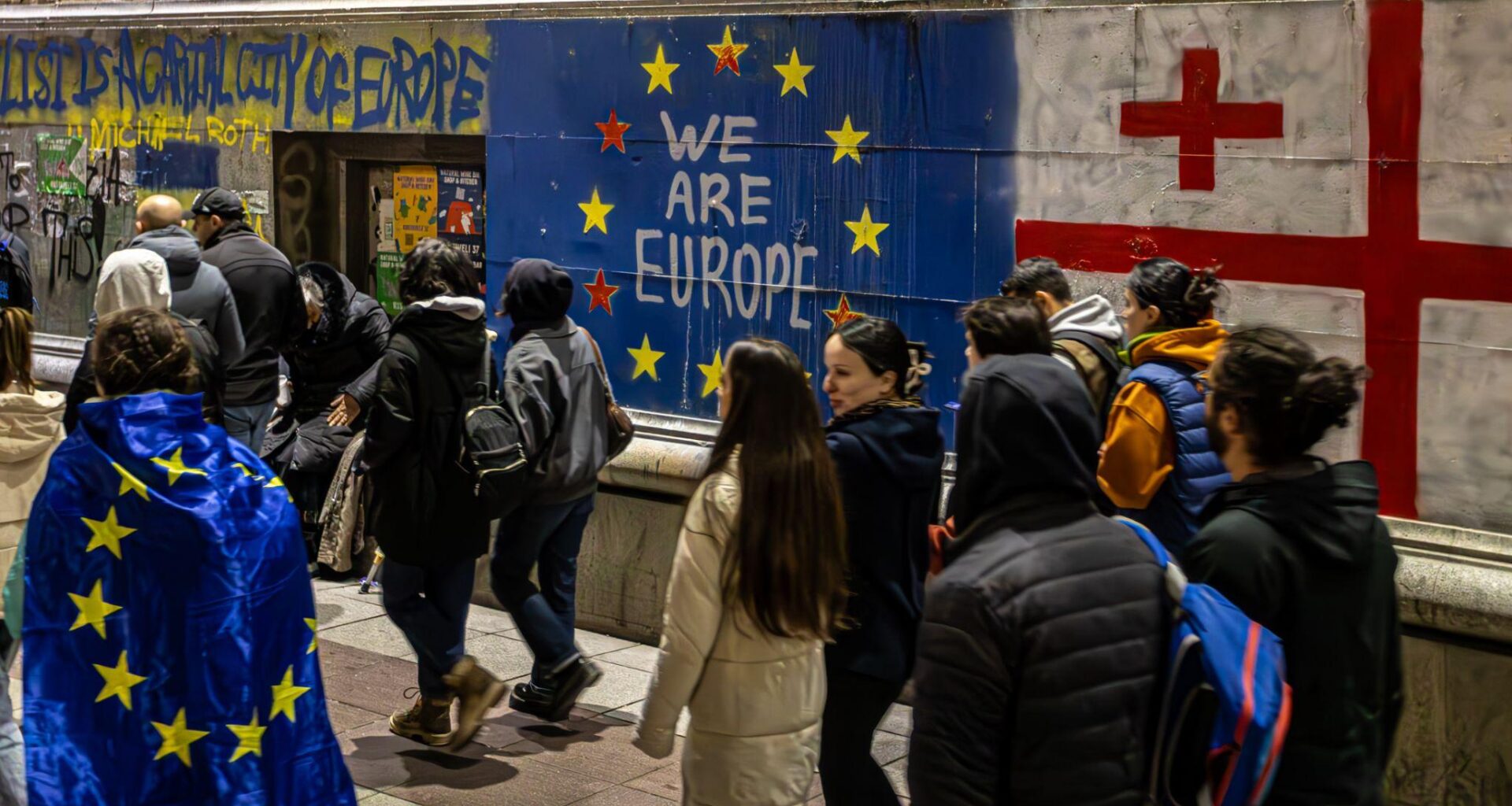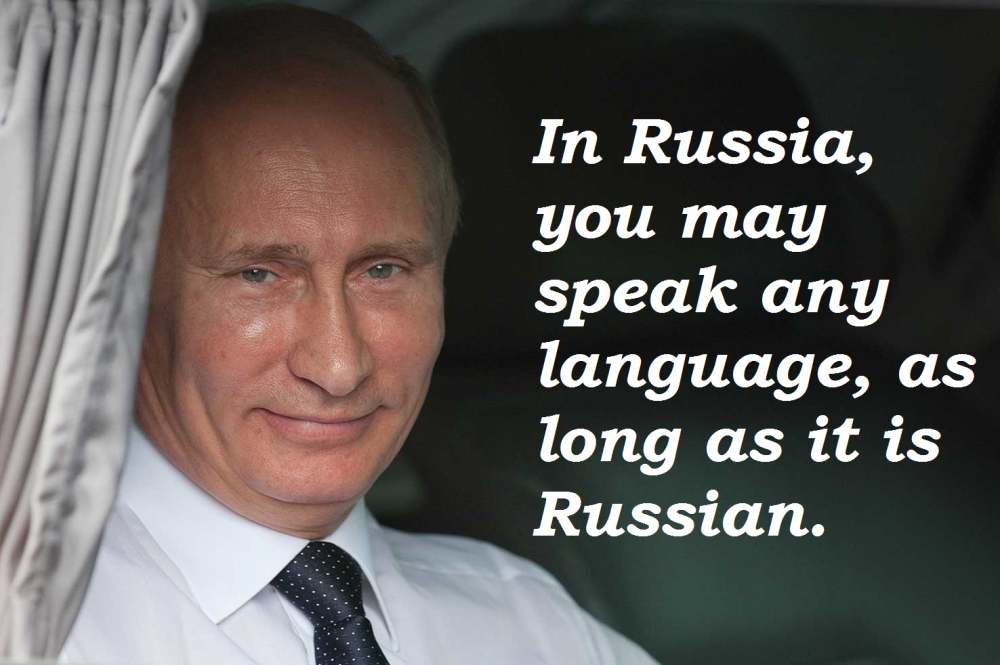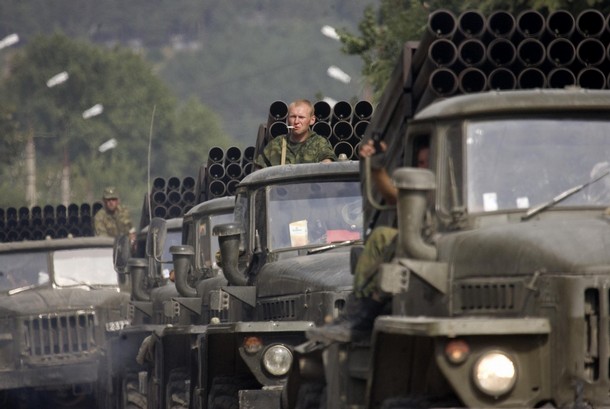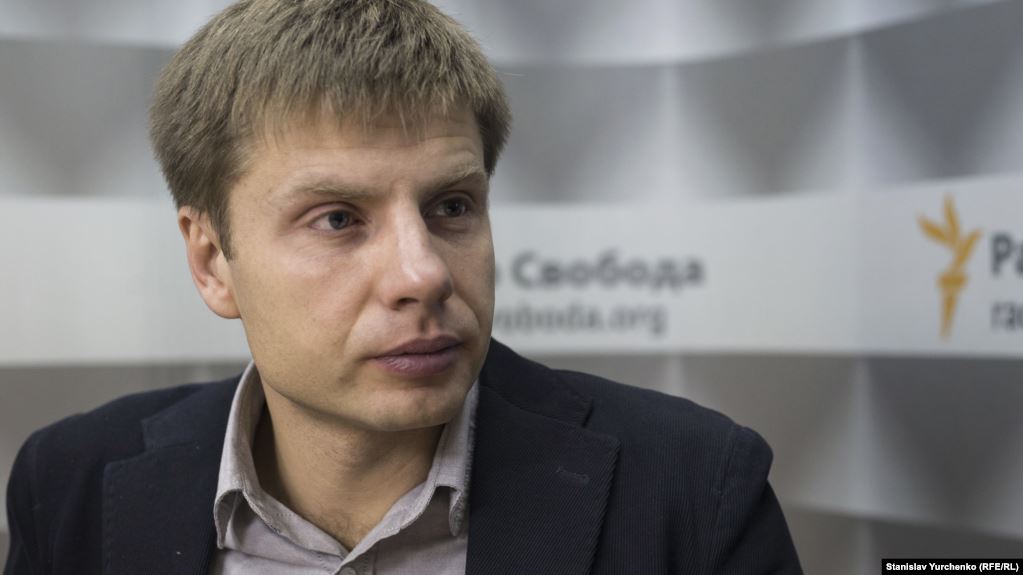Tensions soared after the Central Election Commission (CEC) announced the Georgian Dream’s victory in a fiercely disputed parliamentary election on the night of the elections, 26 October. While Georgian Dream claimed to have won 54% of the vote, opposition parties immediately rejected the results, alleging widespread electoral fraud and coercion.
As opposition leaders rally supporters across the country, they warn that this crisis will determine Georgia's future direction — either a path toward Europe and democracy or an authoritarian regime under Russian influence. Allegations of manipulation spread, including accusations of inflated voter rolls, administrative coercion, and violent repression of opposition members.
Londa Toloraia, an inspector of Wevote.ge, the largest observer group that monitored polling stations across the country on election day, detailed that special concern was raised about violating ballot secrecy through electronic voting machines.
Over 1,100 complaints have been filed with the CEC, with 246 polling stations directly challenged, representing nearly 400,000 voters.
“The practices observed were supported by more than 370 photos and videos, as well as testimonies from observers and citizens,” Toloraia said.
However, these complaints are unlikely to reverse the announced results: the state has “practically total control” over the judiciary, with only one judge taking the side of justice, European Pravda reported.
For many Georgians, these reports shattered their trust in the government and electoral process, sparking anger among opposition supporters who see the Georgian Dream as betraying the country’s aspirations for a European future.
How Georgia pivoted toward Moscow
Georgian Dream, which has governed since 2012, has realigned the nation’s political priorities away from its historical pro-European stance, instead focusing on improving relations with Moscow. Georgian Dream’s founder, billionaire Bidzina Ivanishvili, is often accused by critics of undermining Georgia’s democratic institutions to retain power and advance a pro-Russian agenda.
In recent years, Georgian Dream’s policies have increasingly alienated the country’s European allies.
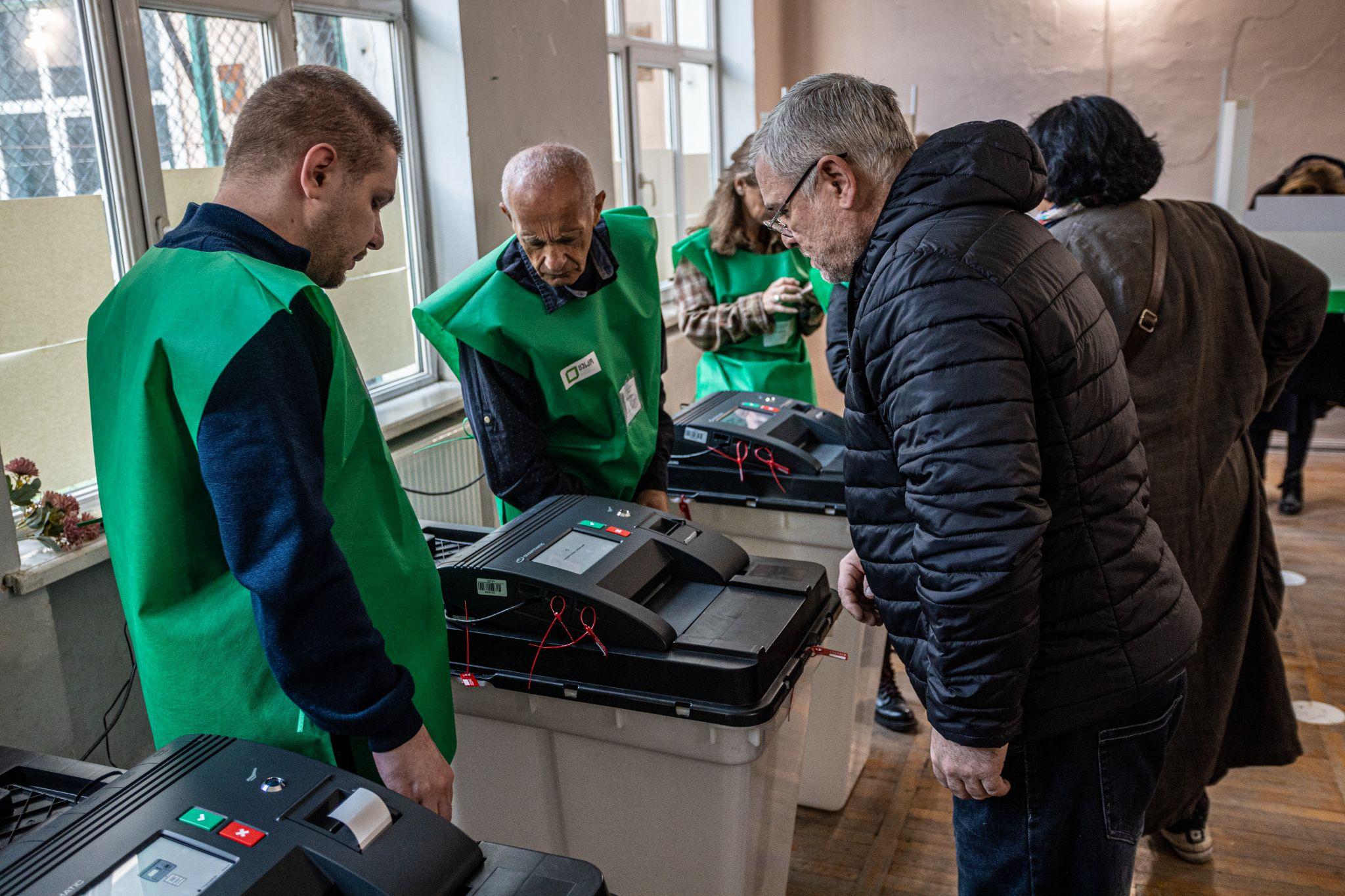
European observers condemned the conduct of the October elections, reporting widespread incidents of voter intimidation, misuse of administrative resources, and smear campaigns targeting independent observers.
This sense of betrayal among the opposition has fueled calls for direct action. “What happened on 26 October is a coup d’État,” Alexander Crevaux-Asatiani, Deputy Director for foreign affairs at the United National Movement (UNM), one of Georgia’s largest opposition parties, told Euromaidan Press.
Opposition organizes to counter governmental influence
“Our first step must be to ensure the international community refuses to legitimize these results,” he continued. The opposition aims to isolate Georgian Dream and pressure Bidzina Ivanishvili directly, proposing European sanctions against him.
“Bidzina only understands the language of sanctions and money,” Crevaux-Asatiani asserted. “We need the EU to sanction him, to show him that he cannot buy Georgia.”
Bidzina Ivanishvili, the informal leader of the Georgian Dream and an oligarch who made his fortune in Russia in the 1990-2000s, is accused of enabling Georgia’s rapprochement with Russia and, thus, democratic backsliding. Closely tied to Russia, he is vulnerable to pressure from the Kremlin.
Despite accusations of voter fraud, the Georgian Dream has its genuine supporters. Under its rule, the small Caucasian country, 20% of which is occupied by Russia, refused to join Western sanctions and has benefited from them.
Over the past decade, Russia’s share in Georgia’s foreign trade has risen from 5% to 13%. This economic growth, which came at the price of growing economic dependence on Russia, contributed to the ruling party's popularity and created conditions for the gradual centralization of power around Ivanishvili and the erosion of democratic institutes.
Much of the pushback against the Georgian Dream comes from the younger generation.
One of the key figures in organizing the protests through social media is Marika Mikiashvili, a determined activist and member of the liberal, pro-Western opposition Droa Party. Speaking from her offices at the top of a building near the parliament in Tbilisi, she emphasizes that sustained public pressure is crucial.
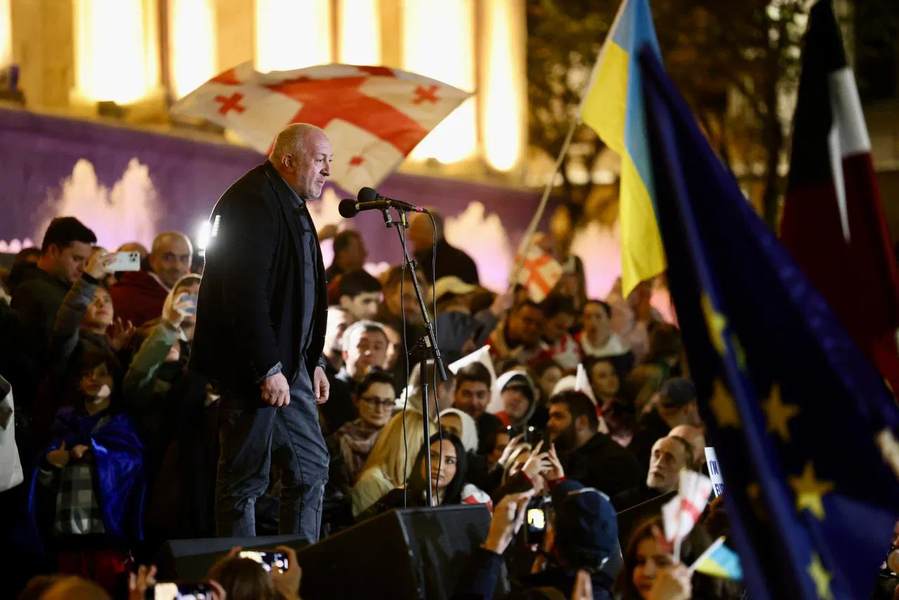
“The pillar of protest is essential. Our strategy is to keep the international community’s focus on Georgia by helping organize increasingly large demonstrations,” she shared between two such rallies.
These demonstrations, largely concentrated on Rustaveli Avenue in Tbilisi, attracted large numbers of citizens, particularly young people, underlining the widespread dissatisfaction with the leaders of the Georgian Dream.
Amid the shouts and chants, the cold stung the demonstrators' faces, but they held firm, singing in unison Beethoven's Ode to Joy, the anthem of Europe. Flags fluttered in the air: Georgian banners with their red crosses, European Union flags symbolizing the aspiration for integration, and Ukrainian flags in solidarity.
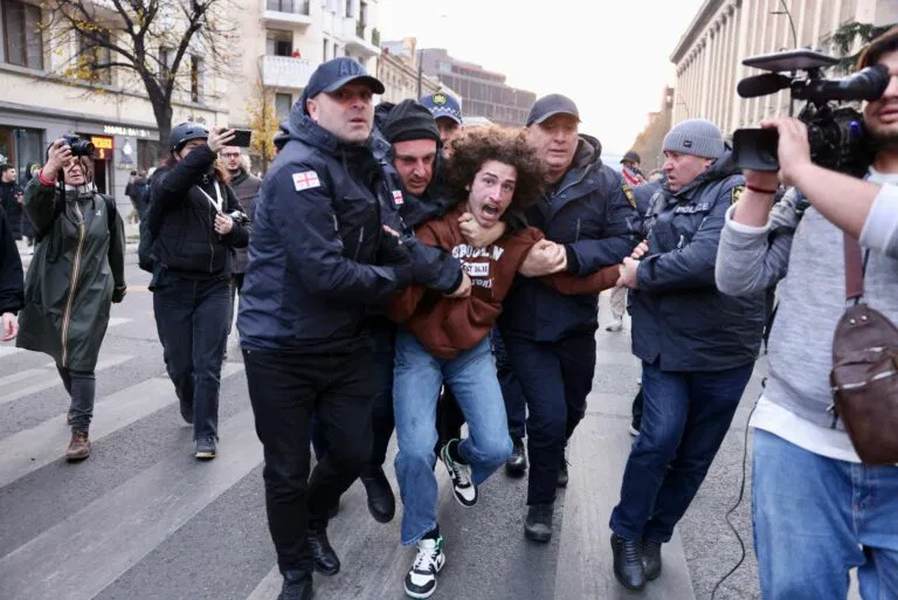
However, police are starting to crack down on the protests. On the morning of 19 November, they broke up a sit-in protest in the parliament and dispersed tents that protesters had begun setting up near the Tbilisi University. According to AP, up to 1,000 people were in the camp.
Gocha Gogsadze, a Georgian civic activist, the Parliament sit-in “is the main tool to break the system in disobedience.”
“I am not sure which places will be blocked next time but at the end of the day, the place in front of the parliament is always the main battleground,” he added.
The dispersal failed to discourage the opposition: protesters were back at the university that evening.
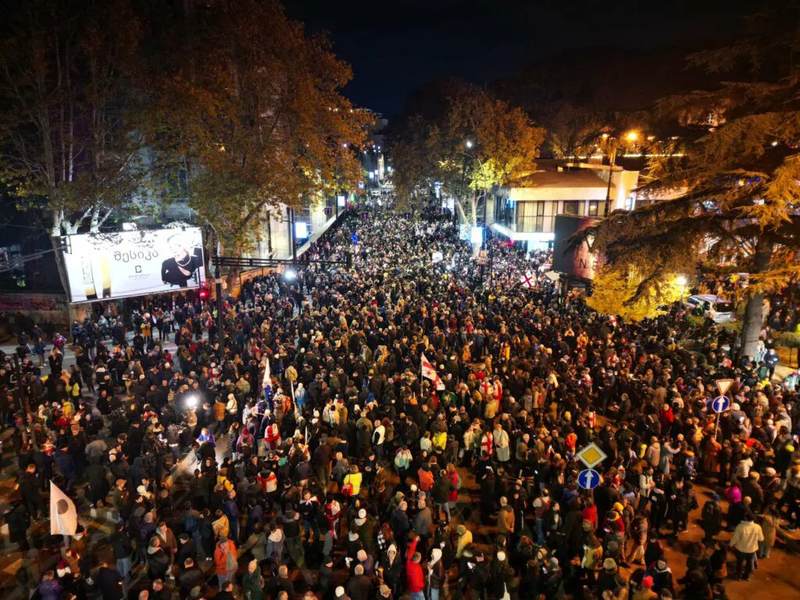
The grassroots networks currently organizing protests were formed during demonstrations against the “foreign agents” law, which required NGOs receiving foreign funding to register as “agents of foreign influence.”
Enacted on 1 August 2024, the law required that NGO that received 20% or more of their funding from abroad must be registered as “pursuing the interests of a foreign power.”
The protests that followed were massive, with at least 169,000 protesters gathering, and some reports suggesting the number reached as high as 200,000.
The grassroots networks formed during demonstrations against the law this May have now become a strategic part of the current protests.
Mikiashvili believes this movement could evolve into a large-scale resistance against Georgian Dream’s rule, especially with student groups joining the effort.
“This is the beginning of something bigger,” she said with conviction. “For the first time in years, political parties and civic leaders are united in opposition, and citizens are backing them because they see them as the real elected government.”
According to her, the protests are no longer just spontaneous demonstrations but have become a structured movement with clear political objectives and broad public support.
In an interview with Euromaidan Press on the day of the election, Giorgi Vashadze, leader of the opposition United National Movement (UNM), described the stakes of the current crisis. “If we change the government, we can accelerate our integration process with the EU,” he stated.
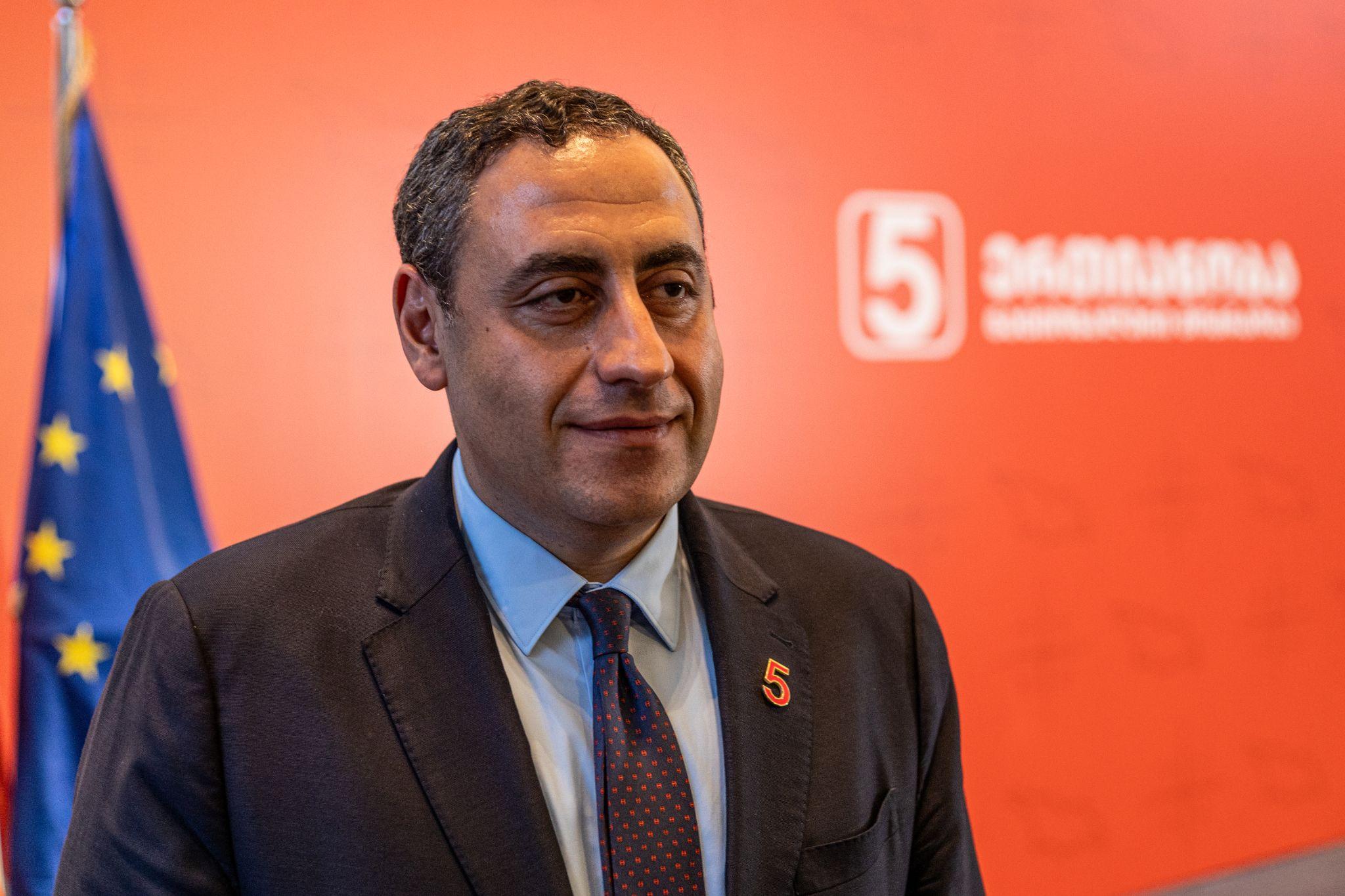
Vashadze stressed Georgian Dream’s ties to Russia, accusing the ruling party of tailoring laws to mirror the Kremlin’s policies. “When you want to get rid of civil society, your only promise is to prosecute and eliminate the opposition. That’s not democratic; that’s pushing us back under Russian control,” he fumed.
Trending Now
Vashadze’s concerns reflect those of many opposition leaders who warn that Georgian Dream’s policies are designed to shift the country’s foreign policy away from the West. UNM officials argue that the pressure must continue to mount if they are to force Georgian Dream to concede to the opposition’s demand for new elections.
“Our only demand is for new elections under international oversight, whose results will be recognized by all parties,” Crevaux-Asatiani told Euromaidan Press.
President Salome Zourabichvili's term on hold
Meanwhile, President Salome Zourabichvili, who has been an independent voice within the government, is nearing the end of her term. Zourabichvili, who has consistently expressed concerns about foreign interference in Georgia’s politics, has now become a symbol of resistance against Georgian Dream’s pro-Russian tilt.
In a recent statement, she accused external forces of meddling in the country’s elections, framing the crisis as part of a broader “hybrid war” designed to pull Georgia back into Russia’s sphere of influence.
Zourabichvili’s departure from office will mark a pivotal moment: her successor will be selected through an indirect election by Georgia’s parliament, a process critics claim will further entrench Georgian Dream’s control.
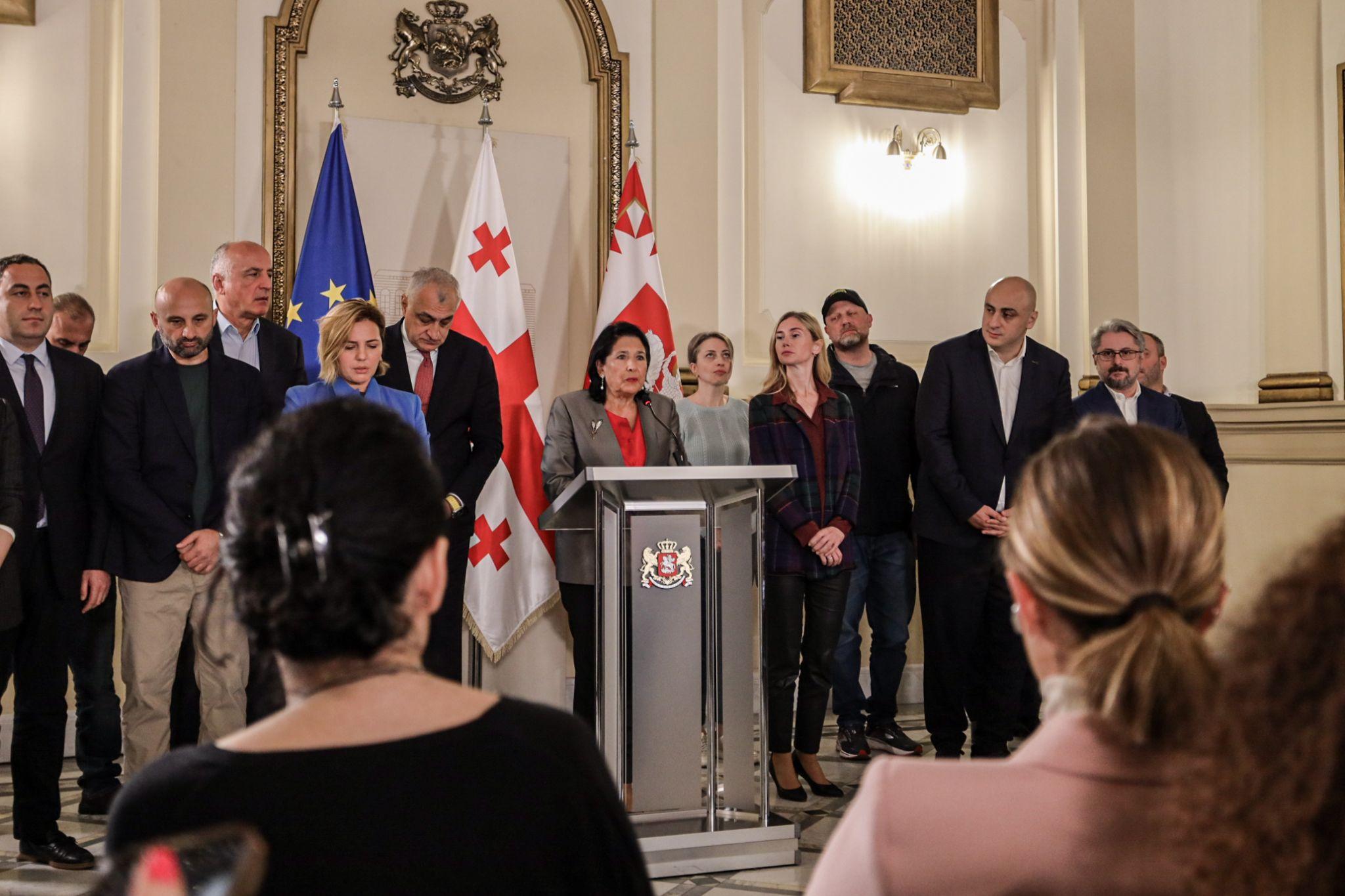
The transition from a direct presidential election to a parliamentary selection process, introduced by Georgian Dream in a 2017 constitutional amendment, has fundamentally altered the nature of the presidency.
At the time, Georgian President Giorgi Margvelashvili reluctantly signed the amendments, which he initially vetoed on the grounds that they would turn the constitution into a “one-party document” favoring the Georgian Dream.
He was right. Despite his objections, Mr. Margvelashvili finally signed the law in order to prevent any possible destabilization, although he expressed his disappointment at the lack of political consensus.
Once a powerful executive position, the role has become largely ceremonial under the current system. The new president will be elected by a 300-member electoral college, which includes members of parliament, representatives from Georgia’s autonomous republics of Abkhazia and Adjara, and local council members nominated by political parties.
Although the opposition has threatened to boycott the election, Georgian Dream’s disputed majority means they can easily meet the required quorum, ensuring that their candidate will assume the presidency without significant opposition.
“They will choose whoever they want to choose. That’s it,” affirmed Marika Mikiashvili. “He will be a full puppet candidate and his loyalty will never be questioned,” she added.
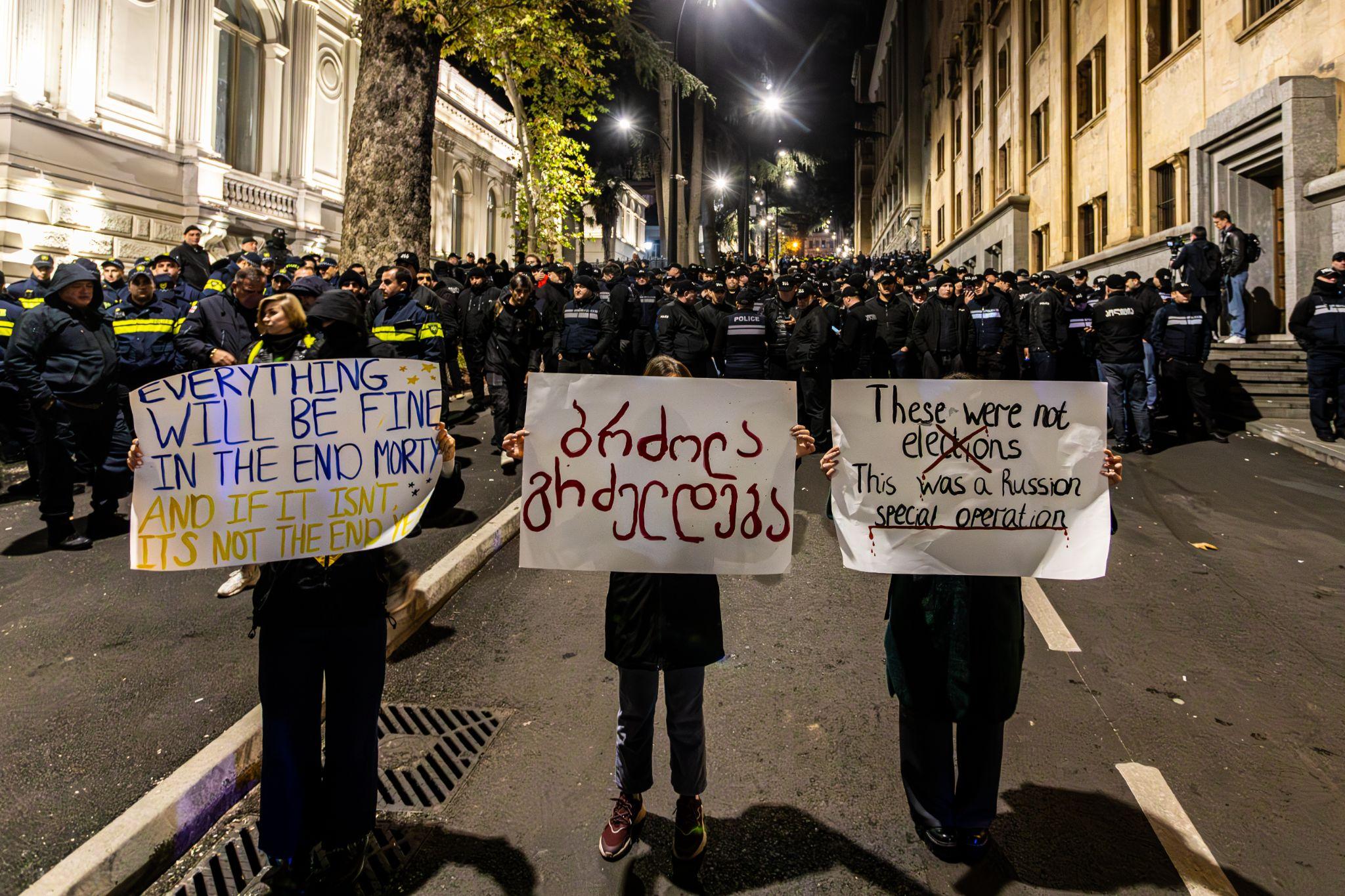
Speculation is rife about Georgian Dream’s potential nominee, with some reports suggesting that former Prime Minister Irakli Garibashvili, a close Ivanishvili ally, is the frontrunner. The selection of a loyal figure like Garibashvili would solidify Georgian Dream’s control over the presidency and eliminate the risk of dissent from within the government.
For Ivanishvili, securing a reliable ally in the presidency is a strategic priority, as both of his previous presidential appointees eventually distanced themselves from the party.
However, an oppositional boycott is likely to deliver more results in the parliament. Currently, oppositional MPs threaten to boycott its work or simply to resign.
In response, the Georgian Dream may attempt to ban the opposition through the controlled Constitutional Court. However, this scenario would only strengthen the arguments of those Western politicians who demand that neither the past elections nor the legitimacy of the new parliament be recognized.
International community can make or break the opposition's revolution
As the political crisis drags on, international attention is focused on Georgia, with many European leaders warning that the country’s current trajectory risks isolating the country from the West.
In a joint statement, several EU officials urged Georgian Dream to respect democratic norms and engage in dialogue with the opposition, cautioning that failure to address these issues could jeopardize Georgia’s EU membership ambitions.
However, some opposition members worry that the international community may seek compromise with the Georgian Dream rather than supporting more direct action.
“The international community will try to negotiate with Georgian Dream if we don’t keep up the pressure,” a UNM leader said.
Meanwhile, the Georgian Dream hopes that protests run out of steam as the cold and Christmas holidays set in. This is why the state refrains from using excessive force, hoping to wait them out. The next steps would be to legalize the electoral results and enter into negotiations with the EU, offering concessions in exchange for recognition of the results, European Pravda writes.
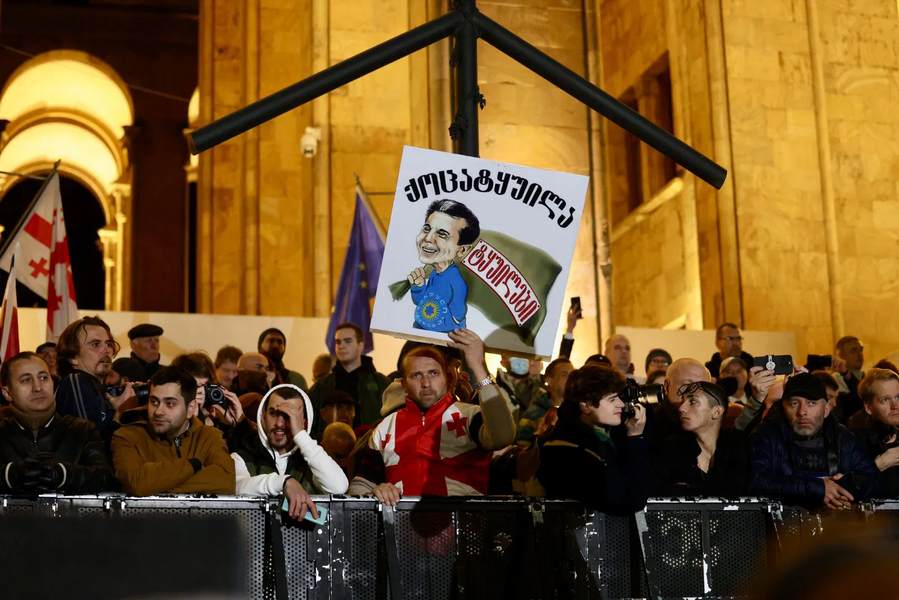
Another major milestone will be the publication of the OSCE Office for Democratic Institutions and Human Rights' full report. Western nations are awaiting this report to finally decide whether they recognize the elections and, consequently, Georgia’s government.
However, ultimately, this decision will be a political one, and it will depend not only on the report but also on whether European leaders are ready for decisive actions and dynamics in the White House, where Georgia’s rapprochement not only with Russia but also with Iran has raised alarm bells.
Street protests and whether the oppositional MPs are ready to resist the pressure of the Georgian Dream will also play a major role.
In the coming weeks, opposition leaders have pledged to continue their rallies, aiming to build a large-scale movement capable of sustaining international pressure on the Georgian Dream. “We will not let Georgia slide back under Russia’s influence,” Mikiashvili insists.
The coming weeks will decide whether the opposition's resolve will not waver. However, what is clear now is that the Georgian Dream’s 12-year rise to power, erosion of democracy, and gravitation toward Russia happened amid a lack of Western resolve for tough policies toward Georgia.
This is despite 90% of Georgian citizens supporting the country's European course, and almost as many -- 89% – opposing rapprochement with Russia.
The victory of pro-European Georgia will not come easily. But real sanctions against the Georgian leadership and the West’s non-recognition of the results will help reinvigorate hope and give it a winning chance.
Related:
- Georgia erupts as president slams Russia’s grip on disputed vote
- “Story of a dying empire”: Georgia’s “foreign agent” law protests echo Ukraine’s Euromaidan
- Bloomberg: Russian intelligence infiltrated Georgian state institutions amid push for EU, NATO membership
- Georgia teeters on edge as pro-Russia party claims disputed win
- From Rose Revolution to “Russian Dream”: Georgia at breaking point with pivotal pro-EU protests

